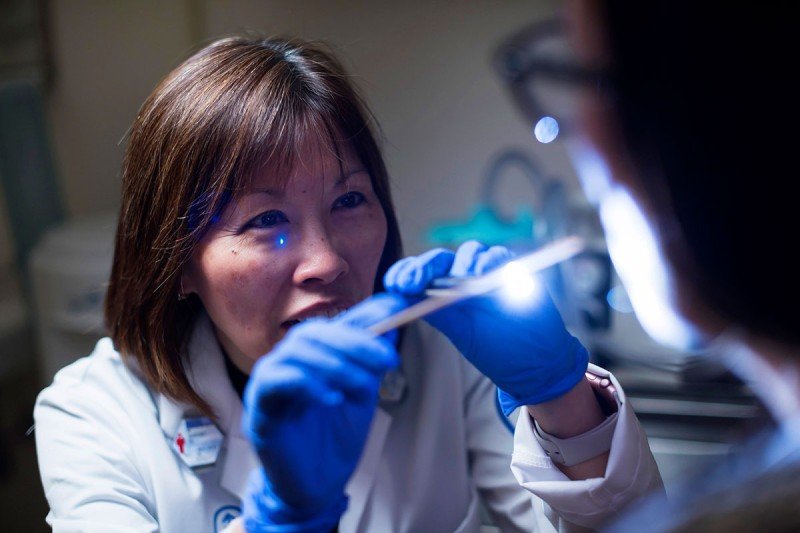
Speech pathologist Margaret Ho works with people who’ve been diagnosed with tongue cancer to minimize the side effects of treatment.
Jessica's Story: An Actor's Triumphant Return After Tongue Cancer
Tongue cancer is a type of head and neck cancer that begins when the cells that make up the tongue grow out of control and form lesions or tumors.
There are two parts to your tongue, the oral tongue and the base of the tongue. Cancer can develop in either part. The oral tongue is the part you see when you stick out your tongue. This is the front two-thirds of your tongue.
The base of the tongue is the back third of the tongue. This part is very near your throat (pharynx). Cancer that develops in this part is classified as oropharynx cancer, or throat cancer.
The information here focuses on oral tongue cancer.
Tongue Cancer Risk Factors & Prevention
Cancer of the tongue can affect anyone. Most cases are linked to tobacco use and heavy alcohol consumption.
Other risk factors for tongue cancer include being male and being over age 40,
The best way to prevent tongue cancer is to avoid the use of all forms of tobacco and limit your alcohol consumption.
Many tongue cancers are first discovered during routine dental exams, so it’s important to see your dentist regularly, especially if you’re at an increased risk for tongue cancer.
Tongue Cancer Symptoms
The symptoms of tongue cancer may include the following:
- red, white, or dark patches on the tongue
- a sore throat that does not go away
- a sore spot (ulcer) or lump on the tongue that does not go away
- pain when swallowing
- mouth numbness
- bleeding from the tongue
Tongue Cancer Diagnosis
A biopsy is the first step in the diagnosis of tongue cancer. During a biopsy, a small amount of tissue is taken from the part of the tongue where cancer is suspected. The tissue is sent to a pathologist, who examines it under a microscope and helps to make the diagnosis.
Special x-rays, such as CT scans, MRIs, or Panorex, may be done. (A Panorex is an x-ray that shows the full upper and lower jaw, plus the sinuses.) These imaging tests provide more details about the cancer. If cancer is found in your tongue, these images can show how deep the cancer is and if it has spread.
At some point, your doctor will tell you the stage of your cancer. The stage measures how widespread or advanced the cancer is. Learn more about the stages of mouth cancer.
Tongue Cancer Treatment
The goals of the treatment of tongue cancer are to:
- cure the cancer
- preserve your appearance and the function of your tongue
- prevent the cancer from coming back
The extent and depth of the cancer guides your plan of care. Surgery is the most common treatment for cancers of the tongue. If the cancer is more advanced, radiation, chemotherapy, or both may be used to shrink the tumor before or after surgery to reduce the risk of the cancer coming back.
People who have surgery to remove large tongue cancers may require reconstructive surgery, as well as help from experts trained in rehabilitation for speech, chewing, and swallowing.
Learn more about our speech and swallowing experts.
Tongue Cancer Surgery
Glossectomy is the name of the surgery used to remove cancers of the tongue. For smaller cancers, only part of the tongue may need to be removed (partial glossectomy). For larger cancers, a more substantial portion of the tongue may need to be taken out.
Reconstruction to rebuild the tongue is often part of the care plan. MSK’s plastic surgeons preserve and reconstruct the remaining portion of the tongue using innovative techniques to achieve the best function possible. For example, they frequently perform a procedure called a radical forearm flap, taking skin from the forearm and the soft tissues underneath to rebuild the tongue. Using microsurgical techniques, they connect the tiny blood vessels and nerves from the forearm tissue to those in the neck. In addition, our plastic surgeons are able to provide sensation in the tongue and enhance a patient’s ability to speak and swallow by transplanting a sensory nerve from the forearm to the tongue.
All our surgeons are recognized nationally and internationally for their expertise in treating tongue cancer. They offer people with tongue cancer unparalleled surgical skill and experience, and they use innovative approaches to preserve your appearance and the function of your mouth.
Our speech and swallowing experts work closely with you before and after your surgery. They will design a personalized rehabilitation regimen for you and make sure you maintain as much function in your tongue as possible.
Learn more about our surgical expertise.
Radiation Therapy for Tongue Cancer
Radiation therapy for cancer of the tongue involves aiming high-energy beams of particles at the tumor. When the particles reach the tumor, they destroy the cancer cells by damaging their DNA.
The radiation therapy team at Memorial Sloan Kettering is highly experienced in caring for people with tongue cancer. They work closely with other members of your care team and will customize a treatment plan so precise that it factors in the size and shape of your tumor to the millimeter. Their goal is not only to eliminate tumor cells but also to prevent the side effects of treatment by keeping the healthy cells in your mouth safe.
Request an Appointment
Available Monday through Friday, to (Eastern time)



